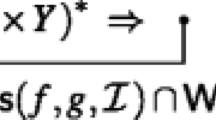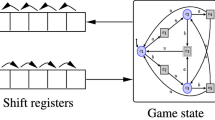Abstract
Reactive synthesis is a technique for automatic generation of a reactive system from a high level specification. The system is reactive in the sense that it reacts to the inputs from the environment. The specification is in general given as a linear temporal logic (LTL) formula. The behaviour of the system interacting with the environment can be represented as a game in which the system plays against the environment. Thus, a problem of reactive synthesis is commonly treated as solving such a game with the specification as the winning condition. Reactive synthesis has been thoroughly investigated for more two decades. A well-known challenge is to deal with the complex uncertainty of the environment. We understand that a major issue is due to the lack of a sufficient treatment of probabilistic properties in the traditional models. For example, a two-player game defined by a standard Kriple structure does not consider probabilistic transitions in reaction to the uncertain physical environment; and a Markov Decision Process (MDP) in general does not explicitly separate the system from its environment and it does not describe the interaction between system and the environment. In this paper, we propose a new and more general model which combines the two-player game and the MDP. Furthermore, we study probabilistic reactive synthesis for the games of General Reactivity of Rank 1 (i.e., GR(1)) defined in this model. More specifically, we present an algorithm, which for given model M, a location s and a GR(1) specification P, determines the strategy for each player how to maximize/minimize the probabilities of the satisfaction of P at location s. We use an example to describe the model of probabilistic games and demonstrate our algorithm.
Similar content being viewed by others
References
Pneuli A, Rosner R. On the synthesis of a reactive module. In: Proceedings of the 16th ACM International Colloquium. ICALP89, 1989, 179–190
Wallmeier N, Hütten P, Thomas W. Symbolic synthesis of finite-state controllers for request-response specifications. In: Proceedings of the 8th International Conference on Implementation and Application of Automata. 2003, 113–22
Alur R, Torre S L. Deterministic generators and games for LTL fragments. ACM Transactions on Computational Logic (TOCL), 2004, 5(1): 1–25
Jobstmann B, Griesmayer A, Bloem R. Program repair as a game. In: Proceedings of the 17th International Conference on Computer Aided Verification. 2005, 226–238
Harding A, Ryan M, Schobbens P Y. A new algorithm for strategy synthesis in LTL games. In: Proceedings of the 11th International Conference on Tools and Algorithms for the Construction and Analysis of Systems. 2005, 477–492
Asarin E, Maler O, Pnueli A, Sifakis J. Controller synthesis for timed automata. IFAC Proceedings Volumes, 1998, 31(18): 447–452
Bloem R, Jobstmann B, Piterman N, Pnueli A. Synthesis of reactive(1) designs. Journal of Computer and System Sciences, 2012, 78(3): 911–938
Wasowski A, Dingel J, Rudie K. Controller synthesis for dynamic hierarchical real-time plants using timed automata. Discrete Event Dynamic Systems, 2017, 27(12): 1–35
Shapley. Stochastic games. Proceedings of the National Academy of Sciences, 1953, 39(10): 1095–1100
Chatterjee K, Henzinger T A, Jobstmann B. Environment assumptions for synthesis. In: Proceedings of the 19th International Conference on Concurrency Theory. 2008, 147–161
Kwiatkowska M, Parker D. Automated verification and strategy synthesis for probabilistic systems. In: Proceedings of the 11th international Symposium, Automated Technology for Verification and Analysis. 2013, 53–22
Neyman A, Sorin S. Stochastic games and applications. Kluwer Academic Publishers, 2003
Nilim A, Ghaoui L. Robust control of markov decision processes with uncertain transition matrices. Operations Research, 2005, 53(5): 780–798
Svoreňová M, Kwiatkowska M. Quantitative verification and strategy synthesis for stochastic games. European Journal of Control, 2016, 30: 15–30
Chatterjee K, Jurdziński M, Henzinger T A. Simple stochastic parity games. In: Proceedings of the 12th International Workshop on Computer Science Logic. 2003, 100–113
Buchi J R, Landweber L H. Solving Sequential Conditions by Finite-State Strategies. New York, Springer, 1990
Alur R, Moarref S, Topcu U. Counter-strategy guided refinement of GR(1) temporal logic specifications. Formal Methods in Computer-Aided Design, 2013: 26–33
Koenighofer R, Hofferek G, Bloem R. Debugging formal specifications: a practical approach using model-based diagnosis and counterstrategies. International Journal on Software Tools for Technology Transfer, 2013, 15(5–6): 563–583
Kuvent A, Maoz S, Ringert J O. A symbolic justice violations transition system for unrealizable GR(1) specifications. In: Proceedings of the 11th Joint Meeting on Foundations of Software Engineering. 2017, 362–372
Maoz S, Ringert J O, Shalom R. Symbolic repairs for GR (1) specifications. In: Proceedings of the 41st International Conference on Software Engineering (ICSE). 2019, 1016–1026
Alfaro L D, Henzinger T A, Kupferman O. Concurrent reachability games. Theoretical Computer Science, 2007, 386(3): 188–217
Emerson E A. Temporal and Modal Logic. Elsevier and MIT Press, 1990, 995–1072
Baier C, Katoen J P. Principles of model checking. MIT Press, 2008
Kesten Y, Piterman N, Pnueli A. Bridging the gap between fair simulation and trace inclusion. In: Proceedings of the 15th International Conference Computer Aided Verification. 2003, 381–393
Acknowledgements
This work was supported by Postgraduate Research and Practice Innovation Program of Jiangsu Province (KYCX20_0225) and the National Natural Science Foundation of China (Grant No.61872371). The work is also supported in part by the grants of Capacity Development Fund of Southwest University (SWU116007) and projects the National Natural Science Foundation of China (Grant Nos.61732019, 61672435, 61811530327, 62032019). All content represents the opinion of the authors, which is not necessarily shared or endorsed by their respective employers and/or sponsors.
Author information
Authors and Affiliations
Corresponding author
Additional information
Wei Zhao is a PhD candidate at Nanjing University of Aeronautics and Astronautics, China. She research orientation is formal method. She receiverd her MS degree at Hubei University majoring in differential geometry, China in 2014.
Rui Li received the BS degree in Hunan Normal University, China in 2018. He is studying for a master’s degree in National University of Defense Technology, China, majoring in software engineering. His research interests include model checking and runtime verification.
Wanwei Liu is an associated professor in School of Computer, National University of Defense Technology, China. He received his Bachelor’s degree and PhD degree in Computer Science from National University of Defense Technology, China. His research interests include theoretical computer science, software/hardware verification and software engineering.
Wei Dong was a Lecturer from 2002 to 2004, and an Associate Professor from 2004 to 2010 in College of Computer Science, National University of Defense Technology, China. Since 2010, he has been a professor in the same institute. He is the author of more than 60 articles and two text books. His research interests include runtime verification, software analysis and testing, model checking, intelligent software development. He has served on more than 20 program committees, and as the program co-chair of several conferences and workshops. He was the member of Administrative Committee of IEEE Reliability Society. He is the member of China Computer Federation (CCF) and the Chair of Changsha Chapter of IEEE RS.
Zhiming Liu is a Professor at School of Computer and Information Science and Director of the Centre for Research and Innovation in Software Engineering (RISE), Southwest University, China. He holds a MSc degree from Software Insti- tute of Chinese Academy of Sciences and a PhD degree in Computer Science from the University of Warwick, UK. His research interest is in theory and methods of software and system engineering, focusing on architecture modelling and design of Neworked Systems of Systems (SoS) and human-cyber-physical systems (HCPS). He is known for his work in Transformational Approach to Fault-Tolerance, Probabilistic Duration Calculus for System Dependability, and Formal Model Driven Method rCOS. He is a founder and member of the steering committees of the international conferences ICTAC, FACS, SEFM and SETTA, and academic director of the Annual Spring School on Engineering Trustworthy Software and Systems (SETSS).
Electronic Supplementary Material
Rights and permissions
About this article
Cite this article
Zhao, W., Li, R., Liu, W. et al. Probabilistic synthesis against GR(1) winning condition. Front. Comput. Sci. 16, 162203 (2022). https://doi.org/10.1007/s11704-020-0076-z
Received:
Accepted:
Published:
DOI: https://doi.org/10.1007/s11704-020-0076-z




